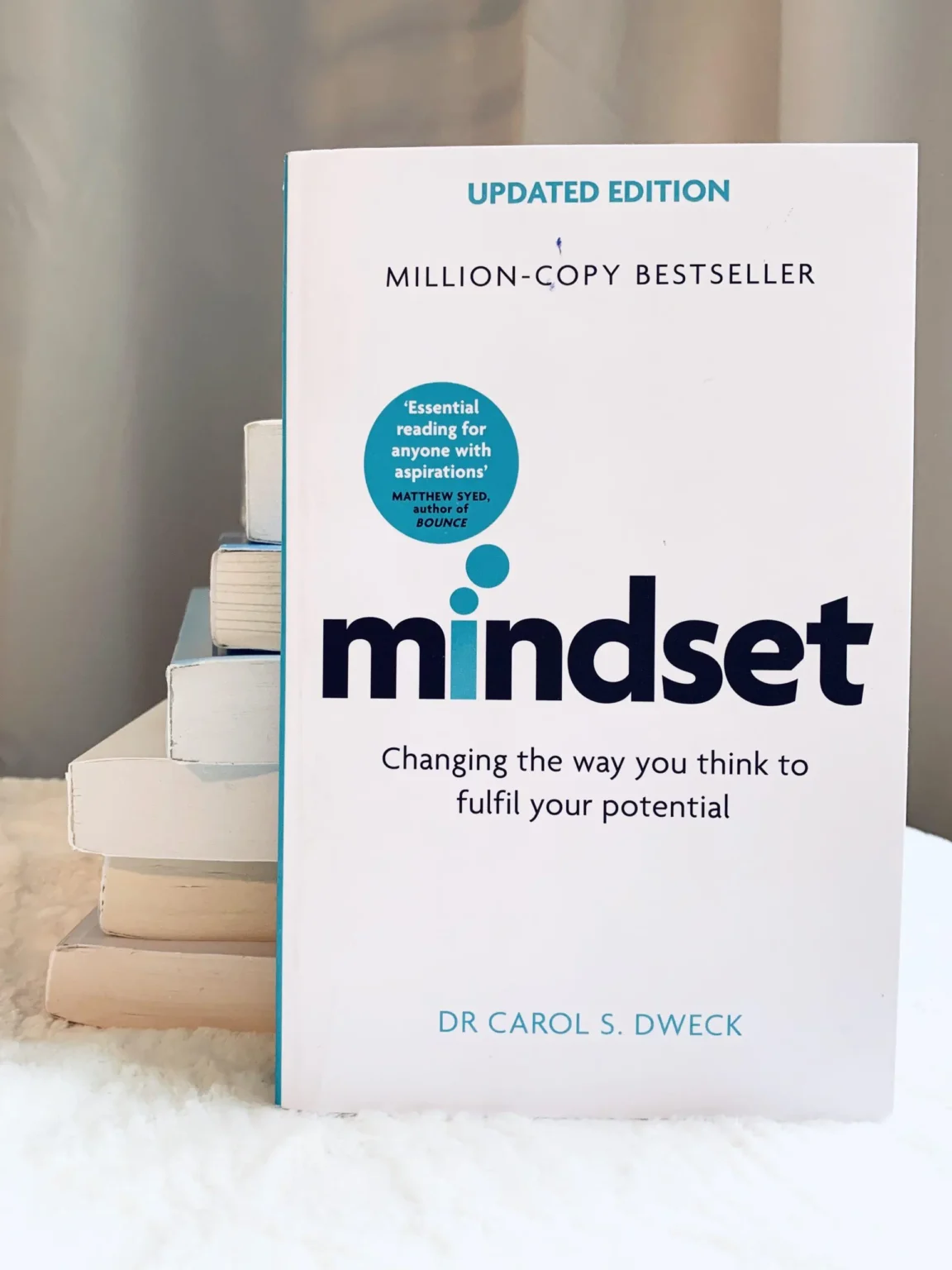
The Mindsets
Having delved into Carol S. Dweck’s enlightening book, “Mindset: The New Psychology of Success,” I found the chapter on “The Mindsets” to be particularly illuminating. Dweck expertly introduces readers to the profound concept of mindsets and explores how they can shape our lives in transformative ways.
In this chapter, Dweck contrasts two distinct mindsets: the fixed mindset and the growth mindset. As someone who has experienced both mindsets at different points in my life, I found Dweck’s insights to be deeply resonant and thought-provoking.
The fixed mindset, as Dweck describes it, is characterized by the belief that our abilities and intelligence are static traits that cannot be changed. Individuals with a fixed mindset may shy away from challenges, fearing that failure will confirm their lack of inherent talent or ability. They may also view effort as fruitless, assuming that success should come effortlessly if one possesses the necessary skills or intelligence.
Conversely, the growth mindset offers a powerful alternative perspective. Those who embrace the growth mindset believe that abilities and intelligence can be developed through dedication, effort, and perseverance. They see challenges as opportunities for learning and growth, understanding that setbacks are temporary and can be overcome with resilience and determination.
As I reflected on my own experiences, I realized how my mindset has influenced my approach to various aspects of life, including academics, career, relationships, and personal development. In moments when I held a fixed mindset, I found myself avoiding challenges and feeling discouraged by setbacks. However, as I began to adopt a growth mindset, I discovered a newfound sense of empowerment and resilience. I became more willing to take risks, embrace failure as a natural part of the learning process, and persist in the face of adversity.
Through Dweck’s insightful exploration of mindsets, I gained a deeper understanding of the profound impact that our beliefs can have on our lives. By cultivating a growth mindset, I learned that we can unlock our full potential, overcome obstacles, and achieve success beyond our wildest dreams. This chapter served as a powerful reminder that our mindset is not fixed; rather, it is a choice that we can consciously cultivate and nurture to create a life filled with growth, fulfilment, and endless possibilities.
Inside the Mindsets
In “Inside the Mindsets,” Carol S. Dweck delves deeper into the intricate ways in which our mindsets influence every aspect of our lives. Drawing from extensive research and real-life examples, Dweck offers profound insights into how our beliefs, attitudes, and behaviours are shaped by the mindset we adopt.
As someone who has explored the terrain of mindset psychology, I found this chapter to be a fascinating exploration of the inner workings of the human mind. Dweck skillfully demonstrates how our mindset not only impacts our academic and professional achievements but also permeates our relationships, personal growth, and overall well-being.
One of the key takeaways from this chapter is the idea that our mindset acts as a lens through which we perceive the world around us. Individuals with a fixed mindset tend to view challenges as threats to their self-image and may become disheartened by setbacks, whereas those with a growth mindset see challenges as opportunities for growth and learning. This fundamental difference in perspective can have profound implications for how we approach life’s challenges and opportunities.
Furthermore, Dweck illustrates how our mindset influences our behaviour in various contexts. For example, individuals with a fixed mindset may avoid seeking feedback or trying new things for fear of failure, whereas those with a growth mindset are more likely to embrace feedback as a tool for improvement and to take calculated risks in pursuit of their goals.
As I reflected on Dweck’s insights, I couldn’t help but recognize the ways in which my own mindset has shaped my beliefs, attitudes, and behaviours. By adopting a growth mindset in my own life, I have been able to approach challenges with greater resilience and optimism and embrace the journey of continuous learning and self-improvement.
In summary, “Inside the Mindsets” offers a compelling exploration of how our mindset influences every aspect of our lives. By understanding the power of beliefs and cultivating a growth mindset, we can unlock our full potential and create a life filled with meaning, fulfilment, and endless possibilities.
The Truth About Ability and Accomplishment
In “The Truth About Ability and Accomplishment,” Carol S. Dweck takes readers on a thought-provoking journey into the realm of intelligence, talent, and the beliefs that shape our success. Through compelling research and real-life examples, Dweck shines a light on the profound influence that our beliefs about intelligence and talent can have on our achievements and resilience in the face of challenges.
As someone who has pondered the mysteries of human potential, I found this chapter to be particularly enlightening. Dweck challenges the conventional wisdom that intelligence and talent are fixed traits, demonstrating instead that our beliefs about these qualities play a pivotal role in determining our outcomes.
One of the central themes of this chapter is the concept of a growth mindset versus a fixed mindset when it comes to intelligence and talent. Individuals with a fixed mindset believe that intelligence and talent are innate traits that cannot be changed, leading them to view challenges as threats to their self-image and to avoid putting in effort for fear of failure. On the other hand, those with a growth mindset believe that intelligence and talent can be developed through dedication, effort, and perseverance, leading them to embrace challenges as opportunities for growth and to persist in the face of setbacks.
Through compelling anecdotes and empirical evidence, Dweck illustrates how our mindset influences our approach to learning, achievement, and resilience. Individuals with a growth mindset tend to outperform those with a fixed mindset, not because they are inherently more talented or intelligent, but because they approach challenges with a sense of optimism, resilience, and determination.
As I reflected on Dweck’s insights, I couldn’t help but recognize the ways in which my own beliefs about intelligence and talent have shaped my journey. By embracing a growth mindset and viewing challenges as opportunities for growth, I have been able to overcome obstacles, achieve success, and continue to evolve and improve as a person.
In summary, “The Truth About Ability and Accomplishment” offers a powerful reminder that our beliefs about intelligence and talent are not fixed; rather, they are malleable and can be cultivated through effort and perseverance. By adopting a growth mindset and embracing the journey of lifelong learning, we can unlock our full potential and achieve success beyond our wildest dreams.
Sports: The Mindset of a Champion
In this captivating chapter, Carol S. Dweck delves into the fascinating world of sports and illuminates the profound impact of mindset on athletic performance. Drawing from extensive research and compelling anecdotes, Dweck explores how athletes’ mindsets shape their motivation, effort, and resilience, ultimately influencing their ability to achieve greatness on the field or court.
As someone who has always been intrigued by the psychology of sports, I found this chapter to be a compelling exploration of the mental game behind athletic success. Dweck reveals how the mindset of a champion is not solely determined by physical prowess or natural talent but by a mindset characterized by dedication, perseverance, and a belief in the power of growth and improvement.
One of the key insights of this chapter is the distinction between a fixed mindset and a growth mindset in the context of sports. Athletes with a fixed mindset may be reluctant to push themselves beyond their comfort zones, fearing failure or the possibility of not living up to expectations. Conversely, those with a growth mindset approach training and competition with a sense of enthusiasm and determination, viewing setbacks as opportunities for learning and growth rather than insurmountable obstacles.
Through compelling examples from the world of sports, Dweck demonstrates how athletes with a growth mindset are able to harness their inner drive and resilience to overcome challenges and achieve success. Whether it’s Michael Jordan’s relentless work ethic, Serena Williams’ unwavering determination, or the underdog stories of athletes who defied the odds, Dweck illustrates how mindset plays a pivotal role in athletic achievement.
As I reflected on Dweck’s insights, I couldn’t help but draw parallels to my own experiences as an athlete. By adopting a growth mindset and embracing the journey of continual improvement, I have been able to push past my limitations, overcome setbacks, and achieve success in my athletic pursuits.
In summary, “Sports: The Mindset of a Champion” offers a compelling exploration of how mindset influences athletic performance. By cultivating a growth mindset characterized by resilience, determination, and a belief in the power of growth and improvement, athletes can unlock their full potential and achieve greatness on and off the field.
Business: Mindset and Leadership
In this thought-provoking chapter, Carol S. Dweck delves into the intricate relationship between mindset and leadership in the dynamic world of business. Drawing from a wealth of research and real-world examples, Dweck explores how leaders’ mindsets shape their leadership styles, decision-making processes, and the overall organizational culture.
I have been fascinated by the intersection of psychology and business, I found this chapter to be a captivating exploration of the role of mindset in driving organizational success. Dweck reveals how leaders‘ mindsets can have a profound impact on employee motivation, engagement, and performance, ultimately influencing the long-term success and sustainability of the business.
One of the central themes of this chapter is the distinction between a fixed mindset and a growth mindset in the context of leadership. Leaders with a fixed mindset may be resistant to change, reluctant to seek feedback, and prone to micromanagement, fearing that admitting mistakes or weaknesses will undermine their authority or credibility. In contrast, those with a growth mindset approach leadership with humility, openness, and a commitment to continuous learning and improvement. They empower their teams, foster a culture of innovation and collaboration, and are not afraid to take calculated risks in pursuit of organizational goals.
Through compelling case studies and real-life examples, Dweck illustrates how leaders with a growth mindset are able to inspire and motivate their teams, drive innovation and change, and navigate uncertainty and adversity with resilience and adaptability. Whether it’s the visionary leadership of Steve Jobs, the empowering leadership style of Sheryl Sandberg, or the transformative leadership of Nelson Mandela, Dweck demonstrates how mindset shapes leaders’ approaches to challenges and opportunities in the ever-evolving landscape of business.
As I reflected on Dweck’s insights, I couldn’t help but recognize the ways in which my own mindset has influenced my leadership style and approach to decision-making in business settings. By embracing a growth mindset and fostering a culture of learning, experimentation, and collaboration, I have been able to inspire my team, drive innovation, and achieve success in the competitive world of business.
In summary, “Business: Mindset and Leadership” offers a compelling exploration of how mindset influences leadership styles, decision-making processes, and organizational culture in business settings. By cultivating a growth mindset and embracing the principles of visionary, empowering leadership, leaders can drive organizational success, inspire their teams, and create a culture of excellence and innovation.
Relationships: Mindsets in Love (or Not)
In this illuminating chapter, Carol S. Dweck delves into the complex dynamics of relationships and uncovers how our mindsets influence our attitudes and behaviours in romantic relationships, friendships, and family dynamics. Drawing from insightful research and relatable anecdotes, Dweck explores the transformative power of mindset in shaping the quality and longevity of our connections with others.
I have navigated the intricate terrain of relationships, I found this chapter to be a compelling exploration of the role of mindset in fostering deep, meaningful connections with others. Dweck reveals how our beliefs about ourselves, our partners, and relationships as a whole can profoundly impact the way we approach love, intimacy, and interpersonal dynamics.
One of the central themes of this chapter is the distinction between a fixed mindset and a growth mindset in the context of relationships. Individuals with a fixed mindset may view relationships as static entities, believing that compatibility and happiness are predetermined and unchangeable. They may be hesitant to invest in growth and development within the relationship, fearing that acknowledging flaws or challenges will lead to its demise. In contrast, those with a growth mindset approach relationships with openness, curiosity, and a commitment to mutual growth and evolution. They embrace challenges as opportunities for learning and strengthening the bond with their partner, and they prioritize communication, empathy, and understanding in navigating the ups and downs of love.
Through poignant stories and insightful observations, Dweck illustrates how our mindset influences every aspect of our relationships, from communication and conflict resolution to intimacy and emotional connection. Whether it’s the transformative power of vulnerability in fostering deeper intimacy, the importance of empathy and understanding in resolving conflicts, or the value of shared values and goals in building a strong foundation for lasting love, Dweck demonstrates how mindset shapes our experiences and outcomes in relationships.
As I reflected on Dweck’s insights, I couldn’t help but recognize the ways in which my own mindset has influenced my attitudes and behaviours in relationships. By adopting a growth mindset and prioritizing communication, empathy, and mutual growth, I have been able to cultivate deeper connections, navigate challenges with grace and resilience, and experience the profound joy and fulfilment that come from authentic, meaningful relationships.
In summary, “Relationships: Mindsets in Love (or Not)” offers a compelling exploration of how mindset shapes our attitudes and behaviours in romantic relationships, friendships, and family dynamics. By embracing a growth mindset and prioritizing communication, empathy, and mutual growth, we can cultivate deeper connections, navigate challenges with resilience, and experience the transformative power of love and connection in all areas of our lives.
Parents, Teachers, and Coaches: Where Do Mindsets Come From?
In this enlightening chapter, Carol S. Dweck delves into the pivotal role of parents, teachers, and coaches in shaping the mindsets of individuals and fostering a culture of growth and resilience. Drawing from extensive research and personal anecdotes, Dweck explores the profound impact that caregivers and mentors have on shaping beliefs, attitudes, and behaviours from an early age.
I found this chapter to be a compelling exploration of the transformative power of mentorship and role modelling. Dweck reveals how the messages and behaviours conveyed by caregivers and mentors can profoundly shape the mindset of individuals, influencing their beliefs about intelligence, talent, and the potential for growth and success.
One of the central themes of this chapter is the idea that mindset is not solely determined by inherent traits or genetic predispositions, but is largely shaped by the messages and expectations conveyed by those in positions of authority and influence. Parents, teachers, and coaches who espouse a growth mindset create an environment that nurtures curiosity, resilience, and a love of learning. They celebrate effort and progress, rather than solely focusing on outcomes, and they encourage individuals to embrace challenges as opportunities for growth and self-discovery.
Through poignant stories and insightful observations, Dweck illustrates how caregivers and mentors can foster a growth mindset in others through their words, actions, and expectations. Whether it’s the encouraging words of a parent who celebrates their child’s effort and progress, the supportive guidance of a teacher who instils a love of learning and curiosity, or the inspiring leadership of a coach who empowers their team to overcome obstacles and achieve greatness, Dweck demonstrates how caregivers and mentors play a critical role in shaping the mindset of individuals and fostering a culture of growth and resilience.
As I reflected on Dweck’s insights, I couldn’t help but recognize the ways in which my own mindset has been shaped by the guidance and support of parents, teachers, and coaches. By surrounding myself with mentors who embody a growth mindset and prioritize effort, resilience, and continuous learning, I have been able to cultivate a mindset characterized by optimism, curiosity, and a belief in the power of growth and improvement.
In summary, “Parents, Teachers, and Coaches: Where Do Mindsets Come From?” offers a compelling exploration of the role of caregivers and mentors in shaping the mindsets of individuals and fostering a culture of growth and resilience. By embracing a growth mindset and prioritizing effort, resilience, and continuous learning, caregivers and mentors can empower individuals to unlock their full potential and achieve success in all areas of life.
Changing Mindsets: A Workshop
In this practical and empowering chapter, Carol S. Dweck provides readers with actionable strategies and techniques for cultivating a growth mindset and overcoming a fixed mindset. Drawing from her extensive research and years of experience, Dweck offers a roadmap for individuals seeking to unlock their full potential and embrace a mindset characterized by resilience, optimism, and a belief in the power of growth and improvement.
I always embarked on the journey of personal growth and development and I found this chapter to be a valuable resource for transforming my mindset and unlocking new possibilities in my life. Dweck offers a wealth of practical advice and exercises that empower readers to challenge limiting beliefs, adopt a growth mindset, and cultivate a mindset that fosters success and fulfilment.
One of the key takeaways from this chapter is the importance of self-awareness in cultivating a growth mindset. Dweck encourages readers to examine their own beliefs, attitudes, and behaviors, and to identify areas where they may be holding themselves back with a fixed mindset. By becoming aware of our own mindset patterns, we can begin to challenge negative self-talk, embrace challenges as opportunities for growth, and adopt a more positive and resilient mindset.
Dweck also offers practical strategies for fostering a growth mindset in others, whether as parents, teachers, coaches, or leaders. By providing encouragement, support, and constructive feedback, we can create an environment that nurtures curiosity, resilience, and a love of learning in those around us.
Through interactive exercises, reflection prompts, and real-life examples, Dweck guides readers on a transformative journey of self-discovery and growth. Whether it’s reframing challenges as opportunities for learning, celebrating effort and progress, or cultivating a mindset of resilience and optimism, Dweck empowers readers to take ownership of their mindset and unleash their full potential.
As I implemented Dweck’s strategies and techniques in my own life, I experienced a profound shift in my mindset and outlook. By embracing a growth mindset and adopting a more positive and resilient attitude towards challenges, I have been able to overcome obstacles, achieve success, and experience greater fulfilment in all areas of my life.
In summary, “Changing Mindsets: A Workshop” offers a comprehensive guide for cultivating a growth mindset and overcoming a fixed mindset. By embracing Dweck’s practical strategies and techniques, readers can unlock their full potential, overcome obstacles, and achieve success beyond their wildest dreams.
The Road Ahead
In this reflective and forward-looking final chapter, Carol S. Dweck invites readers to contemplate the profound implications of mindset for personal growth, success, and well-being. Drawing from the insights shared throughout the book, Dweck explores the transformative power of mindset in shaping our lives and offers a glimpse into the future of research and application in this field.
As we embark on this final leg of our journey through “Mindset: The New Psychology of Success,” I am reminded of the profound impact that mindset has had on my own life. Through Dweck’s insightful exploration of the fixed mindset and the growth mindset, I have gained a deeper understanding of the ways in which our beliefs shape our attitudes, behaviors, and outcomes in every aspect of life.
In this chapter, Dweck encourages readers to reflect on their own mindset journey and to consider the implications of adopting a growth mindset for personal growth, success, and overall well-being. By embracing a growth mindset characterized by resilience, optimism, and a belief in the power of growth and improvement, we can unlock our full potential and achieve success beyond our wildest dreams.
Moreover, Dweck discusses the future of mindset research and application, highlighting the importance of continued exploration and innovation in this field. As scientists delve deeper into the mechanisms underlying mindset and its impact on behavior and outcomes, there is tremendous potential for new insights and discoveries that can further enhance our understanding of human potential and empower individuals to thrive in an ever-changing world.
Dweck also emphasizes the importance of widespread dissemination and application of mindset principles in various domains, including education, business, sports, and personal development. By integrating mindset interventions into educational curricula, organizational cultures, and personal growth strategies, we can empower individuals of all ages and backgrounds to cultivate a growth mindset and achieve success and fulfillment in their lives.
As I look ahead to the future, I am filled with optimism and excitement for the possibilities that lie ahead. By embracing the principles of growth and resilience, we can navigate the challenges and opportunities that await us on the road ahead and continue our journey of personal growth, success, and well-being.
In summary, “The Road Ahead” offers a poignant reflection on the transformative power of mindset and its implications for personal growth, success, and well-being. As we embrace the journey of growth and continue to explore the frontiers of mindset research and application, we can unlock our full potential and create a future filled with possibility, purpose, and fulfillment.


 Title
Title  Date
Date Category
Category